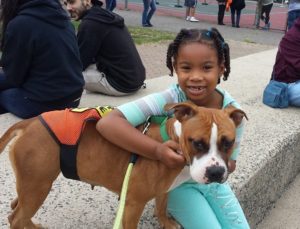 So you’re ready to adopt a dog – congratulations! Meeting adoptable dogs is exciting and fun, but can also sometimes be nerve-wracking and overwhelming. Given that you are preparing to bring a new family member into your home, you want to be sure that it is a good fit. I always like to say that there is no such thing as a bad question when you’re searching for a new dog, because the focus should really be on learning as much as you can, about whatever is most important to you! That said, these lists should help get you started when meeting adoptable dogs.
So you’re ready to adopt a dog – congratulations! Meeting adoptable dogs is exciting and fun, but can also sometimes be nerve-wracking and overwhelming. Given that you are preparing to bring a new family member into your home, you want to be sure that it is a good fit. I always like to say that there is no such thing as a bad question when you’re searching for a new dog, because the focus should really be on learning as much as you can, about whatever is most important to you! That said, these lists should help get you started when meeting adoptable dogs.
Note: there are no “right” or “wrong” answers to these questions. In fact, many of these questions might not apply to you (for example, you might not care if the dog has growled at cats if you don’t have a home with a cat in it) and might not even be worth asking. The goal of these questions is not to help you determine whether this is a “good dog” or not, but rather whether this is a dog that will fit into your home and lifestyle.
Meeting dogs who have been living in a kennel/shelter environment:
If you are meeting a dog that has been living in a kennel, keep in mind that it’s not uncommon for a dog’s personality to be hindered in that environment, and (sometimes) take weeks to develop once in a home setting. (In my opinion, these are some of the most rewarding adoptions!) That said, there is lots of information that you can learn about these dogs from their caregivers.
Note: It is always a good idea to meet the dog outside of their kennel, as their behavior in the kennel (with exciting people standing right on the opposite side of the barrier) is rarely an indicator of a dog’s personality.
- Is there a staff member or volunteer who spends a lot of time with this dog or knows him well? (If so, this is the person you should ask to speak with!)
- Do you know if this dog has lived in a home before? (If yes, and the dog was an “owner surrender,” ask if you can see the notes from the surrendering owner – many times you’ll learn helpful tidbits such as if the dog has lived with children, other dogs, etc. Or, if the dog has been in a foster home before, ask if you can speak with the foster parent and ask some of the questions outlined below.)
- What has the dog’s typical routine been in the shelter?
- What does the dog’s energy level seem to be? (High (craves exercise like running and long walks as much as possible), Medium (likes a good romp or walk but then settles down in the kennel), or Low (prefers to sleep and sniff/meander) – again, keep in mind this could change outside the kennel environment!)
- Does the dog soil his kennel, or go potty as soon as he is taken outside? (This is sometimes an indicator of being housebroken, but not always.)
- Has the dog been on any outings (i.e. hikes, sleepovers, trips to busy adoption events, etc)? If so, what were the events like and how did the dog act at those events?
- Has the dog ever growled, lunged or barked at a person? If so can you describe that situation (where, who, etc.)?
- Has the dog ever growled, lunged or barked at another dog? If so can you describe that situation)?
- What kind of food has the dog been eating at the shelter (brand, kibble, wet, other)?
- Is the dog a good eater, or picky?
- Has the dog participated in any play dates or pack walks with other dogs? If so, what has his behavior been like? (You can also ask to observe a pack walk or play date if you’d like, and if you already have a dog make sure to bring him to meet his potential new sibling!)
- Has the dog met a cat before? If so, what was his behavior like? (You can also ask to observe a “cat test”
- Has the dog interacted with children? If so, what was the situation (i.e. on a leash or off, how old was the child, etc. – ask for specifics!) and how did he act in that situation?
- Can I take the dog for a little walk? (Some organizations will let you do this, especially if accompanied by a staff member or volunteer. It’s a good way to interact with the dog and to see how much leash training he is going to need.)
- Does the dog have any known medical issues, and have they been treated?
- Will the dog be spayed/neutered/microchipped/vaccinated before adoption? (You will want to ask for full and complete vet records upon adoption.)
- Will the dog come with an intro health insurance policy? (This is not uncommon at well-funded organizations)
- How has the dog’s behavior been when examined and handled by the medical staff (i.e. accepts all handling, runs away, growls, etc.)?
- Does the dog show different behaviors when left alone in his kennel versus when someone is in the room? (This can sometimes be an indicator of separation anxiety, but not always!)
- Does the dog know any training commands/cues? (If so, ask to see the dog in action!)
Meeting dogs who have been living in a foster home:
If you’re meeting a dog who has been living in a foster home, you will want to make sure that their foster parent is present at the meet and greet (or, if that’s not possible, try to arrange a conversation at another time) because this person is going to have the most information for you.
Note: meeting a dog on its (foster) home turf is always preferable from an adopter’s perspective, but if the foster is not comfortable having strangers over to their home, you’ll need to respect that.
- What has the dog’s typical routine like in your home?
- How many walks per day, and how long?
- Where does he sleep, and during what hours?
- How long is he left alone, and where does he stay when he is left alone?
- When does eat?
- What does the dog’s energy level seem to be? (High (craves exercise like running and long walks as much as possible), Medium (likes a good romp or walk but then settles down in the kennel), or Low (prefers to sleep and sniff/meander) – again, keep in mind this could change outside the kennel environment!) Note: this is subjective, and you can determine this yourself based on what the foster parent tells you about the dog’s typical routine. Some people might call a dog who needs two, one mile walks per day “high energy,” whereas other people would call that low. Ask for specifics and come to your own conclusions based on your lifestyle!
- Is the dog housebroken? If no, when or how often does he have accidents?
- What sorts of outings (i.e. hikes, sleepovers, trips to busy adoption events, etc) has the dog been on? What were the outings like and how did the dog act on those outings?
- How often and for how long is the dog left alone, where does he stay when left alone (crate, single room, free roam) and what has his behavior been when left alone? (Keep in mind that unless they have a camera on the dog when they are out, they might not know this, but they’ll at least know if there’s any destruction or accidents when they return!)
- Has the dog ______ (insert activity you would like to do with your future dog, example: gone swimming) and how was the dog’s behavior when he ______?
- Has the dog ever growled, lunged or barked at a person? If so can you describe that situation (where, who, etc.)?
- Has the dog ever growled, lunged or barked at another dog? If so can you describe that situation)?
- How does the dog act when someone rings the doorbell or knocks, and when that person comes inside?
- What kind of food has the dog been eating at your home(brand, kibble, wet, other)?
- Is the dog a good eater, or picky?
- Do you have another dog? If so, how does this dog do with your dog? (Ask to observe them together!)
- Has the dog participated in any play dates or pack walks with other dogs? If so, what has his behavior been like, and are their particular dogs (size, gender, etc.) that he seems to prefer over others? (You can also ask to observe a pack walk or play date if you’d like, and if you already have a dog make sure to bring him to meet his potential new sibling!)
- Do you have a cat? If so, how does the dog do with your cat?
- Do you have children? If so, how has the dog done with your children? If not, has the dog interacted with children? If so, what was the situation (i.e. in the foster home or elsewhere, how old was the child, etc. – ask for specifics!) and how did he act in that situation?
- Can I take the dog for a little walk? (A good opportunity to walk and talk with the foster parent.)
- Has the dog ridden in the car? If so, how does he behave in the car?
- Does the dog have any known medical issues, and have they been treated?
- Will the dog be spayed/neutered/microchipped/vaccinated before adoption? (You will want to ask for full and complete vet records upon adoption.)
- Will the dog come with an intro health insurance policy? (This is not uncommon at well-funded organizations)
- How has the dog’s behavior been when examined and handled by medical staff (i.e. accepts all handling, runs away, growls, etc.)?
- Does the dog know any training commands/cues? (If so, ask to see the dog in action, and ask what training methods were used!)
Once you’ve committed to adopting your dog, be sure to read the followup post to this one, “Your first day with your new dog“!
